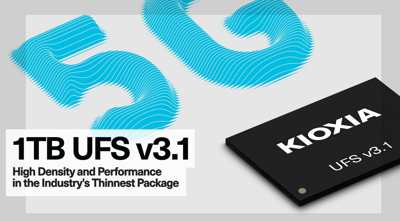Kioxia Sampling 1TB Universal Flash Storage V3.1 Embedded Flash Memory Devices
Using BiCS Flash 3D memory, sequential read speed of up to 2,050MB/s and sequential write speed of up to 1,200MB/s
This is a Press Release edited by StorageNewsletter.com on March 11, 2021 at 2:17 pmKioxia America, Inc. announced sampling of its 1TB Universal Flash Storage (UFS) Ver. 3.1 embedded flash memory devices.
Housed in a 1.1mm-high package – making it the thinnest 1TB UFS [1] offering available – this product utilizes the company’s BiCS flash 3D flash memory and achieves sequential read speed of up to 2,050MB/s and sequential write speed of up to 1,200MB/s.
Mobile devices are constantly evolving, and 5G networks are poised to deliver levels of speed, scale and complexities the likes of which have never been seen before. Reaping the connectivity benefits of 5G – namely, faster downloads and reduced lag time – requires high performance and low power consumption. Additionally, with 5G making it easier and faster for users to store even more on their mobile devices, the storage requirements for smartphones and other applications are increasing at a rapid pace. The 1TB UFS brings R/W performance, low power consumption, shortened application launch times and storage capacity demanded by 5G and other digital consumer products.
This device integrates BiCS Flash 3D flash memory and a controller, which performs error correction, wear leveling, logical-to-physical address translation and bad-block management for simplified system development.
“Kioxia continues to demonstrate its leadership in UFS memory with the introduction of the world’s thinnest package 1TB UFS device,” noted Scott Beekman, senior director, managed flash memory products. “As we scale to higher densities and increase performance, we enable the next gen of smartphones and mobile applications to continue to expand their features and capabilities.“
UFS 1TB device includes following features:
-
WriteBooster: Enables faster write speeds.
-
Host Performance Booster (HPB) Ver. 2.0: Improves random read performance by utilizing the host side memory to store logical to physical translation tables. While HPB Ver. 1.0 only enables 4KB chunk size access, HPB Ver. 2.0 enables wider access – which can further boost random read performance.
[1] Source: Kioxia Corporation survey, as of March 2, 2021















 Subscribe to our free daily newsletter
Subscribe to our free daily newsletter


